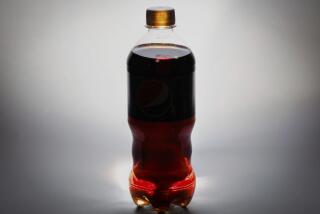A Fat Chance of Changing the Diet : Nutrition: Food substitutes may offer the best way for Americans to eat the sweet or fatty things they crave and still maintain or lose weight.
- Share via
Americans talk a lot about reprogramming their eating habits to focus on healthier food choices--but then they opt for high-tech fake foods from decaf coffee to low-fat “ice cream.”
Nearly three in four American women regularly choose some sort of food substitute, diet sodas or no-cholesterol brownies, according to an article in Harper’s Bazaar.
Thanks to an ever-growing array of artificial sweeteners and fake fats, many once-taboo foods now seem permissible.
“Health professionals are just as guilty of wanting those rich tastes as the rest of the public,” said Harvey Anderson, professor and chairman of the department of nutritional sciences and faculty medicine at the University of Toronto. “More than anybody, we realize how difficult it is to cut out fat, and many of us have pushed to have substitutes developed.”
The evidence is mixed on how much fat substitutes and artificial sweeteners reduce eating problems. Recent studies show that after a meal of reduced-fat foods, we tend to make up the calories later that day but fat intake remains reduced. Can decreased fat without reduced calories add up to weight loss?
“Possibly,” said Barbara Rolls, professor of psychiatry at Johns Hopkins University School of Medicine. “Some research indicates that if people consume the same number of calories, but less of it in the form of fat, they can lose an average of one-half pound a week.”
Dr. Dean Ornish, director of the Preventive Medicine Research Institute at UC San Francisco, said fat calories are converted into body fat much more efficiently than protein or carbohydrate calories, adding:
“In our studies of people who were put on very low-fat vegetarian diets after heart attacks, we found that the average weight loss was 22 pounds the first year, even though they were eating a greater quantity of foods.”
Are the chemicals in fake foods safe? In April 1977, the Food and Drug Administration proposed a ban on saccharin based on evidence that it could cause urinary bladder cancer in experimental animals. After claims by scientists that the animal tests were inconclusive, the ban was postponed until May 1992.
Aspartame and acesulfame-K, sweeteners approved by the FDA, are generally considered safe in average doses.
The makers of Olestra have given the FDA more than 20,000 pages of safety study results in their successful effort to gain approval for this artificial fat. Simplesse, made from ingredients found naturally in food, required no further tests.
“The final word isn’t in on the safety of many artificial sugars and fats,” said Michael Jacobson, executive director of the Center of Science in the Public Interest.
No one knows for certain what determines a person’s “fat tooth,” but several studies show that while it is fairly easy to wean oneself off salt, fat is another matter.
“National surveys reveal that a great number of us have successfully switched from whole milk to low-fat or skim milk, but the consumption of desserts is not decreasing,” said Lilian Cheung, director of the Nutrition and Fitness Project at the Harvard School of Public Health.
“Many Americans have been brought up to think of rich desserts as a much-deserved indulgence at the end of a hard day. It’s going to be pretty difficult to get them to eat a piece of fruit instead of a bowl of ice cream. But they might accept a frozen dessert that’s lower in fat yet tastes similar. That’s where fat substitutes can make a difference.”
Psychiatry professor Rolls added:
“The problem with artificial sweeteners and reduced-fat foods is that people expect them to be magical. They want to believe that if they choose these items, they don’t have to watch what else they eat, they don’t have to exercise, and they’ll still lose weight. That just isn’t going to happen.”






